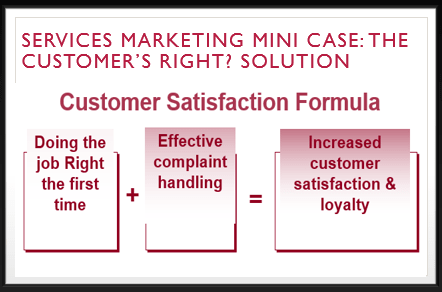Q1: What factors contributed to Maree’s sense of annoyance and frustration in ‘The customer’s right’ case study?
It should be noted that Maree was frustrated initially from a service failure (or at least a perceived service failure), however the clerk’s attempt at recovery only made the situation worse.
The factors that contributed to her annoyance were:
- Not getting her mail in the first place
- Possible lapsing insurance policies and credit card penalties (that she believed were not her fault)
- Waiting in line for 20 minutes
- Being told they would have to return to original post office to make complaint
- Being told it was “…clearly your fault. There’s nothing I can do to help.”
Q2. How might the post office clerk have better handled the encounter with Maree and Tony?
The post office clerk should not have been so confrontational and unhelpful. Laying the complete blame on the customer and stating that there is nothing that can be done to help is just not constructive and not good recovery technique. Instead the clerk should have empathized with Maree and Tony, showing understanding and sympathy for their situation, and then attempted to make sure that future mail would go to the correct address.
Also, the Post Office’s systems are partly to blame for the annoyed customers. Long waiting times and inflexible complaint mechanisms (having to go back to the original store) further exacerbate the problem instead of fixing it.
Additional Mini-Case question:
It may also be interesting to ask your students what Maree and Tony could have done to better handle the encounter. Most people will find themselves in a similar situation where they become so angry that they lose sight of their goals and make the situation worse by pushing the service employee into becoming defensive and unhelpful.
Of course, had Maree and Tony completed the initial form correctly, then the problem may have been avoided altogether, but given the mistake, Maree’s fury towards the clerk pressed him/her to adopt a defensive position. Remaining calm but firm is a better strategy.
Q: Demonstrate your understanding of the fundamental attribution error.
A: Westerners tend to attribute the blame for a service failure to internal, dispositional behavior, (i.e. under the control of the firm), whereas Asians tend to attribute blame to situational factors that are out of the control of the firm.
Implications do the SOCAP/TARP study results for managers
- Make it easier for customers to complain
- Encourage genuine complaints
- Dedicate someone to take responsibility for ensuring the complaint is followed up and resolved
- Set standards for compliant resolution
- Avoid ping-ponging at all costs
- Conduct root cause analysis to establish the cause of failures
- Train staff in service recovery


